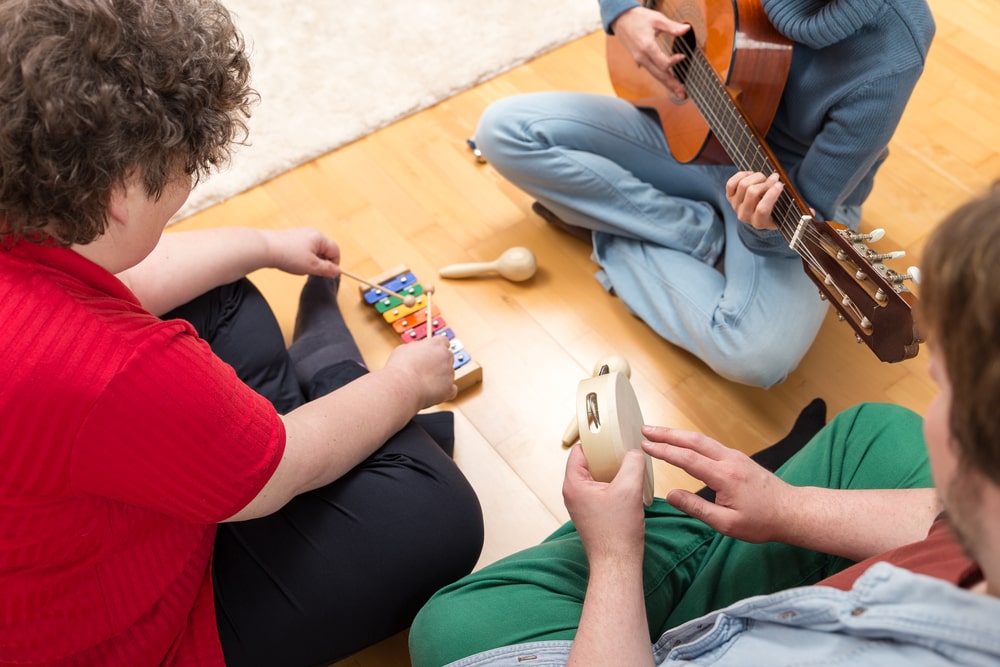Autism, also known as autism spectrum disorder (ASD) is listed the Diagnostic and Statistical Manual of Mental Disorders, Fifth Edition (DSM-5) as a mental disorder. It is a developmental disability that can cause significant social, communication, and behavioral challenges. There are a variety of treatment options available for a teenager with ASD, and each young person will benefit from a tailored treatment plan. To understand the benefits of art and music therapy, it is helpful to be aware of the common symptoms of ASD. Below are some examples of symptoms that can be exhibited in teens with autism spectrum disorder, provided by the Cleveland Clinic:
- Difficulty carrying conversations with peers.
- Verbal communication deficits.
- Strict need for routine and structure.
- Preoccupations with a specific topic.
- Challenges with regulating emotions.
- Experiences sensory overload frequently.
- Unable to empathize.
- Difficulty interpreting social cues.
- Unable to maintain friendships.
ASD will manifest distinctly and each teenager with ASD will have a unique combination of associated symptoms. According to the Centers for Disease Control and Prevention (CDC), autism affects an estimated 1 in 54 children in America.
Benefits of Art and Music Therapy
Art therapy and music therapy are distinct psychotherapeutic interventions that respectively fall under the hypernym known as expressive arts therapy. Positive Psychology explains expressive arts therapy as a “multimodal holistic health intervention that mobilizes creative expression in the service of healing both mind and body.” The American Art Therapy Association defines art therapy as “an integrative mental health and human services profession that enriches the lives of individuals, families, and communities through active art-making, creative process, applied psychological theory, and human experience within a psychotherapeutic relationship.” There are many benefits of art therapy, some of which include the following, provided by the Canadian Counselling and Psychotherapy Association:
- Promotes self-reliance, developmentally age-appropriate autonomy, and self-sufficiency.
- Enables a teen to verbally and nonverbally communicate emotions that may otherwise be abandoned.
- Improves self-esteem and increases resilience.
- The process encourages the development of healthy coping strategies.
- Facilitates self-expression and self-discovery.
Music therapy is an evidence-based therapy that, according to Cleveland Clinic, relies on “the clinical use of music to accomplish individualized goals such as reducing stress, improving mood and self-expression…[and] may include listening, singing, playing instruments, or composing music.” Rather than focusing on verbal articulation and communication, music therapy emphasizes listening to and creating music as a form of healing. There are a variety of physical and mental health benefits of music therapy. Some of the possible physiological changes that can occur in a teenager that participates in music therapy may include, but are not limited to, the following examples, provided by the American Music Therapy Association:
- Lower blood pressure.
- Improved respiration.
- Reduced heart rate.
- Improved cardiac output.
- Relaxed muscle tension.
- Lower levels of anxiety.
- Increased pain threshold.
- Improved memory.
- Enhanced motivation.
Music therapy can increase socialization and emotional development in teenagers with ASD. Exposure to creative outlets and specialized modes of expressive arts therapy, like art and music therapy, can help teenagers with autism spectrum disorder enhance imagination, hone abstract thinking, and promote sensory integration and regulation. Expressive arts therapy supports developmental growth, helps teenagers with ASD refine visual-spatial skills, recreation, and leisure skills, and improve overall quality of life.
For Information and Support
Every family in need of mental health treatment must select a program that will best suit the needs of their family. When one member of a family struggles, it impacts everyone in the family unit. To maximize the benefits of treatment we work closely with the entire family to ensure that everyone is receiving the support they need through these difficult times.
Seeking help is never easy, but you are not alone! If you or someone you know needs mental health treatment, we strongly encourage you to reach out for help as quickly as possible. It is not uncommon for many mental health difficulties to impact a person’s life, long term. Pursuing support at the beginning of one’s journey can put the individual in the best position to learn how to manage themselves in a healthy way so they can go on to live happy and fulfilling lives.
OUR KNOWLEDGEABLE ADMISSIONS TEAM CAN BE REACHED 24/7 AT INFO@PACIFICRTC.COM OR CALL: 800-531-5769
We are available to answer any questions you may have regarding mental health treatment and our residential program, anytime. Contact us today using the form to the right.






